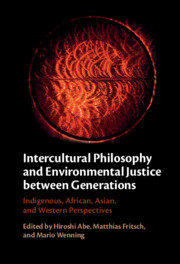 Intercultural Philosophy and Environmental Justice between Generations
Intercultural Philosophy and Environmental Justice between Generations A Confucian Perspective
from Part II - Intergenerational Ethics in Dialogue with Confucianism and Daoism
Published online by Cambridge University Press: 14 March 2024
This chapter engages with the world of ghosts and spirits (guishen 鬼神) in the classical Chinese tradition. While there has been agreement about the existence of ghosts, their status and the duties of currently living humans to them is all but clear. We argue that a Confucian innovation consists in acknowledging the existence of the spirit world in an “as if” mode. In this conception, humans share obligations of respect while they are well advised to practice attentive distancing to these beings. The mechanisms governing a haunted cosmos are ultimately beyond human comprehension. Ghosts are stand-ins and correctives who reveal the limits of human control and comprehension. We conclude by discussing the potential contributions of this Confucian conception of ghosts and spirits to contemporary debates on intergenerational justice.
To save this book to your Kindle, first ensure [email protected] is added to your Approved Personal Document E-mail List under your Personal Document Settings on the Manage Your Content and Devices page of your Amazon account. Then enter the ‘name’ part of your Kindle email address below. Find out more about saving to your Kindle.
Note you can select to save to either the @free.kindle.com or @kindle.com variations. ‘@free.kindle.com’ emails are free but can only be saved to your device when it is connected to wi-fi. ‘@kindle.com’ emails can be delivered even when you are not connected to wi-fi, but note that service fees apply.
Find out more about the Kindle Personal Document Service.
To save content items to your account, please confirm that you agree to abide by our usage policies. If this is the first time you use this feature, you will be asked to authorise Cambridge Core to connect with your account. Find out more about saving content to Dropbox.
To save content items to your account, please confirm that you agree to abide by our usage policies. If this is the first time you use this feature, you will be asked to authorise Cambridge Core to connect with your account. Find out more about saving content to Google Drive.